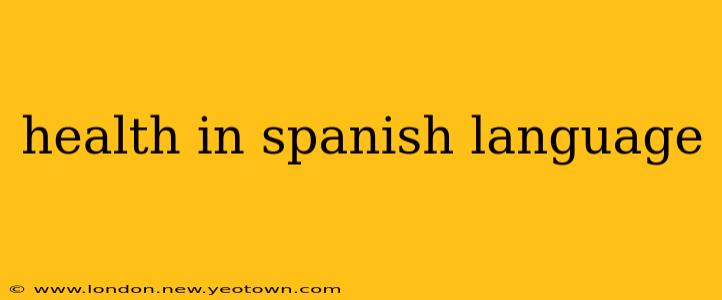Salud: Exploring the Nuances of Health in Spanish
The word "health" in Spanish isn't as straightforward as a simple translation might suggest. While salud is the most common and widely understood term, the concept of health in Spanish culture and language encompasses much more than just the absence of disease. It's a holistic idea, weaving together physical well-being, mental fortitude, and social harmony. Let's delve into the rich tapestry of "salud" and its multifaceted meanings.
What is the most common word for "health" in Spanish?
The most common and widely accepted word for "health" in Spanish is salud. This word is used in virtually all contexts, from discussing physical health ("Tengo buena salud," meaning "I have good health") to offering a toast ("¡Salud!") which literally translates to "health!" but acts as a celebratory wish for well-being.
What are some other ways to express "health" or related concepts in Spanish?
While salud covers most bases, Spanish offers a beautiful range of expressions to describe different facets of health. For example:
-
Bienestar: This term emphasizes overall well-being, encompassing physical, mental, and emotional health. It suggests a state of comfort and happiness. You might say, "Busco un mayor bienestar en mi vida," meaning "I seek greater well-being in my life."
-
Sanidad: This word refers more specifically to public health or the state of being free from disease. It's often used in the context of healthcare systems or public health initiatives.
-
Forma física: This translates literally to "physical form" and refers to physical fitness and condition. It's the term you'd use when discussing someone's physical shape and their training regimen.
-
Mental health: While there isn't a single perfect equivalent, the most common way to express "mental health" is "salud mental." However, phrases like "bienestar psicológico" (psychological well-being) or "equilibrio emocional" (emotional balance) are also frequently used and convey a similar meaning.
How does the concept of health differ between English and Spanish-speaking cultures?
The difference isn't in the words themselves, but rather in the cultural understanding of health. Spanish-speaking cultures often place a stronger emphasis on the interconnectedness of physical, mental, and social well-being. Family and community support play a significant role in maintaining salud. For example, the concept of familia (family) goes beyond blood relations; it encompasses a strong network of support that contributes significantly to one's overall well-being. This holistic view of health is often reflected in traditional remedies and approaches to healthcare.
Are there specific idioms or expressions related to health in Spanish?
Yes! Spanish is rich in idioms and expressions related to health. Here are a couple:
-
Estar como una rosa: This charming expression translates to "to be like a rose" and signifies being in excellent health.
-
Tener mala cara: This idiom means "to have a bad face" and suggests someone is unwell or feeling poorly.
Exploring the nuances of "salud" allows us to appreciate the depth and richness of the Spanish language and its connection to cultural understanding. It's more than just a word; it's a reflection of a holistic view of well-being that encompasses the physical, mental, emotional, and social aspects of life.

